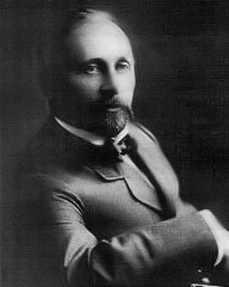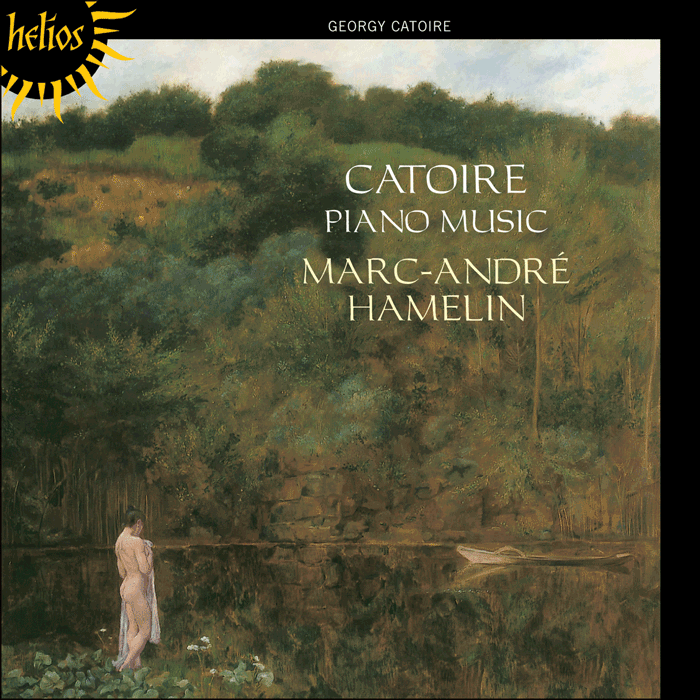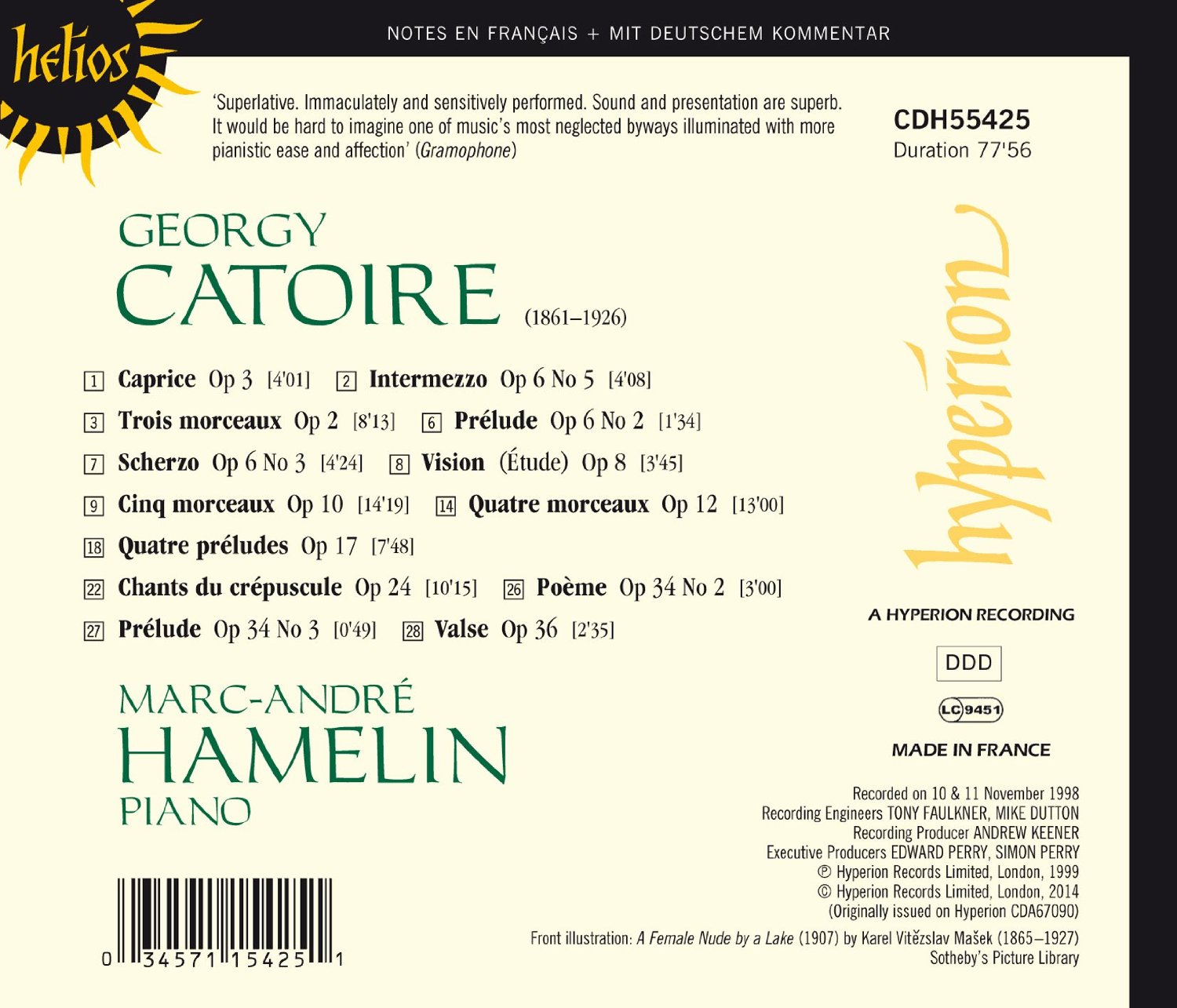Share This
Album at a Glance
Tags
Related Posts
Georgy Catoire (1861-1926): Piano Music / Marc-André Hamelin, piano
Posted by Paul Ballyk on Jan 26, 2015 in Romantic | 0 comments
This recording on Hyperion's mid-priced Helios imprint was made in 1998. If you missed it the first time around, you can, and should, remedy that now. The music is performed by long-time Hyperion artist, Marc-André Hamelin, a pianist who time and again has exposed the extraordinary music of little known or completely unknown composers. This Georgy Catoire album is a case in point, and will be a welcome discovery for any ardent explorer of the Romantic piano repertoire.
Georgy Catoire (1861-1926) was born in Russia to parents of French descent. His musical abilities as both pianist and composer were apparent at a very young age, however he had no musical training until the age of fourteen when he began piano lessons. Perhaps the most significant offshoot of those early lessons was his introduction to and a deep appreciation for the music of Wagner, a development which no doubt influenced his compositions.
For the most part, the program is arranged chronologically, revealing an interesting evolution to Catoire's style. Especially in his earlier works, the music is lush and colorful, with sweeping melodies and quite an original panache in terms of harmonic progressions and rhythmic invention. It might be described as having a mystical quality like Scriabin, the harmonic colorations of Fauré and Rachmaninov's thrilling technical virtuosity. In his middle opuses, his music grew more chromatic, and often had a darkness to it not previously present - the Quatre préludes, Op. 17 is a good example. Listening to the next opus on the album, Chants du crépuscule, Op. 24, this trend continues. I found these later works to be more interesting and engaging than the earlier ones. The samples in the right sidebar provide two contrasting selections from Catoire's early period, the Prélude, Op. 6 no. 2 and Scherzo, Op. 6 no. 3.
This beautiful music certainly deserves to be known much more widely than it is. Perhaps one reason it is so foreign to both the concert stage and the recording studio is that it is so technically demanding. We're fortunate to have these performances by Mr. Hamelin, a pianist with the chops to make the thorniest passages sound as though there are no technical considerations whatsoever to his interpretations.
Marc-André Hamelin adds another mystery name to his discography with this album of piano music of the almost unknown Russian Georgy Catoire (a French father explains the inauthentic-sounding surname). Catoire was one of a large number of composers who flourished in pre-Revolutionary Russia at the turn of the twentieth century, and his musical style is very much of that period. Primarily a miniaturist, most of his pieces can be described as mood pictures rather than as anything more abstract, his more sophisticated use of harmony giving his style a more cosmopolitan feel than some of his Russian contemporaries such as Liadov or Arensky. Perhaps he can best be compared to earlier Scriabin but without the neuroticism found in the latter’s work.
The modesty of Catoire’s output and its irrelevance to Bolshevik Russia have undoubtedly led to its neglect, but just as this music has attracted Marc-André Hamelin’s advocacy it will no doubt appeal to a new audience of listeners who can now rediscover it.
Source: Hyperion Records
 |
Georgy Catoire, composer Georgy Lvovich Catoire (Moscow, April 27, 1861 – May 21, 1926) was a Russian composer of French heritage. He studied piano in Berlin with Karl Klindworth (a friend of Richard Wagner) from whom he learned to appreciate Wagner. Catoire became one of the few Russian ‘Wagnerite’ composers, joining the Wagner society in 1879. Catoire graduated from Moscow University in mathematics in 1884 with outstanding honours. Upon graduating, Catoire worked for his father’s commercial business, only later becoming a full-time musician. It was at this time that Catoire began taking lessons in piano and basic harmony from Klindworth’s student, V. I. Willborg. These lessons resulted in the composition of a piano sonata, some character pieces, and a few transcriptions. The most famous of these transcriptions was the piano transcription of Tchaikovsky’s Introduction and Fugue from the First Orchestral Suite (which Jurgenson later published at the recommendation of Tchaikovsky). Not satisfied with his lessons with Willborg, Catoire went to Berlin in late 1885 to continue his lessons with Klindworth. Throughout 1886, Catoire made brief trips to Moscow, and on one of these trips, he became acquainted with Tchaikovsky, who was greatly pleased with Catoire’s set of piano variations. Tchaikovsky told the younger composer that, “it would be a great sin if he did not devote himself to composition”. In a letter to Rimsky-Korsakov, Tchaikovsky later described Catoire as, “very talented… but in need of serious schooling.” Rimsky-Korsakov then gave Catoire one lesson before passing him to Lyadov. This single lesson resulted in three piano pieces which were later published as Catoire’s op.2. With Lyadov, Catoire studied counterpoint and wrote several pieces, including the lovely Caprice op.3. Lyadov’s lessons concluded Catoire’s formal schooling. After returning to Moscow, Catoire became quite close to Anton Arensky. During this period, Catoire wrote his second quartet (which he later rewrote as a quintet) and his cantata, “Rusalka”, op.5, for solo voice, women’s chorus and orchestra. Catoire’s family, friends, and colleagues were not sympathetic to his choice of career in composition, so in 1899, after a series of disappointments, Catoire withdrew to the countryside and nearly stopped composing entirely. After two years of withdrawal from society, having broken off almost all connections with musical friends, the Op. 7 Symphony emerged in the form of a sextet as a result of this seclusion. From 1919 he was professor of composition in the Moscow Conservatory. He wrote several treatises on theory and composition during his tenure. Nikolai Myaskovsky considered students of Catoire with great regard. Today he is very little known, although a few recordings exist of his piano works by Marc-André Hamelin, Anna Zassimova and Alexander Goldenweiser, and David Oistrakh and Laurent Breuninger recorded the complete violin music. His music has a certain semblance to the works of Tchaikovsky, the early works of Scriabin, and the music of Fauré. Catoire’s compositions demand not only high virtuosity but also an ear for instrumental colour. Georgy Catoire is the uncle of author and musician Jean Catoire. Georgy Catoire is a great-grandfather of pianist Ekaterina Messner, who teaches at the Moscow Conservatory. |
|
Marc-André Hamelin, piano Marc-André Hamelin (born September 5, 1961), is a Canadian virtuoso pianist and composer. Born in Montreal, Quebec, Marc-André Hamelin began his piano studies at the age of five. His father, a pharmacist by trade who was also an amateur pianist, introduced him to the works of Alkan, Godowsky, and Sorabji when he was still young. He studied at the École de musique Vincent-d’Indy in Montreal and then at Temple University in Philadelphia. In 1989 he was awarded the Virginia Parker Prize. Marc-André Hamelin has given recitals in many cities. Festival appearances have included Bad Kissingen, Belfast, Cervantino, La Grange de Meslay, Husum Piano Rarities, Lanaudière, Ravinia, La Roque d’Anthéron, Ruhr Piano, Halifax (Nova Scotia), Singapore Piano, Snape Maltings Proms, Mänttä Music Festival, Turku and Ottawa Strings of the Future, as well as the Chopin Festivals of Bagatelle (Paris), Duszniki and Valldemossa. Marc-André Hamelin appears regularly in both the Wigmore Hall Masterconcert Series and the International Piano Series at London’s South Bank Centre. He plays annually in the Herkulessaal in Munich and has given a series of recitals in Tokyo. He has made recordings of a wide variety of composers with the Hyperion label. His recording of Leopold Godowsky’s complete Studies on Chopin’s Études won the 2000 Gramophone Magazine Instrumental Award. He is well known for his attention to lesser-known composers especially of the late nineteenth and early twentieth century (Leo Ornstein, Nikolai Roslavets, Georgy Catoire), and for performing works by pianist-composers such as Leopold Godowsky, Charles-Valentin Alkan, Kaikhosru Sorabji, Nikolai Kapustin, Franz Liszt, Nikolai Medtner and Frederic Rzewski. In 1985 he won the Carnegie Hall International Competition for American Music. In 2004 Hamelin received the international record award in Cannes. He has been made an Officer of the Order of Canada and a Chevalier de l’Ordre national du Québec (National Order of Québec). Most recently, he won the 2008 Juno Award for Classical Album of the Year: Solo or Chamber Ensemble—Alkan Concerto for Solo Piano. His first marriage was to soprano Jody Karin Applebaum. He currently lives in Boston, Massachusetts, with his second wife Cathy Fuller, pianist and WGBH classical music broadcaster. Source: http://en.wikipedia.org/wiki/Marc-Andr%C3%A9_Hamelin |
![]() About Paul Ballyk
About Paul Ballyk
all about Paul
Twitter •
| Thinking about purchasing this album?
Follow this link for more album details or to make the purchase. Buy it now |
“Not just recommended. Guaranteed.”
We stand behind every album featured on Expedition Audio. Our objective is to take the monetary risk out of music exploration. If you order this album from HBDirect.com and do not like it you can return it for a refund.







